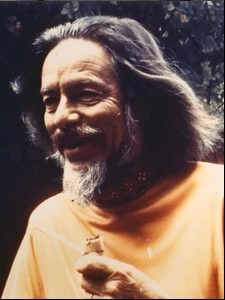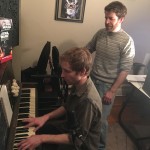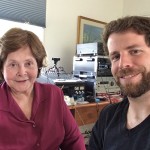My latest Composer Quest episode features superfan Dan Wheeler’s Top 10 moments from the podcast. As episode 100 approaches, I thought I would also reflect on these interviews and post my own list of podcast moments that have most influenced my composing. I also just happened to notice a call from the American Composers Forum to post an advice video aimed at students applying for their NextNotes award…
Why start a composer quest?
 About two year ago, I was inspired by hippie philosopher Alan Watts to give up all sensible sources of income and re-commit myself to my true passion: composing. In Alan’s words:
About two year ago, I was inspired by hippie philosopher Alan Watts to give up all sensible sources of income and re-commit myself to my true passion: composing. In Alan’s words:
“Better to have a short life that is full of what you like doing than a long life spent in a miserable way. And after all, if you do really like what you’re doing, it doesn’t matter what it is, you can eventually…become a master of it. It’s the only way to become a master of something, to be really with it. And then you’ll be able to get a good fee for whatever it is.”
I started obsessively interviewing two friends per week about their composing techniques, trying to dissect this mysterious art. Soon, I was hearing voices; little whispers of advice from my interviewees came back to me as I sat at the piano to compose. Here are a few gems that have stuck with me after 99 interviews for Composer Quest.
1. Ask a Question
“Write not from a place of wanting to make a statement, but from a place of wanting to ask a question. Ideally, it’s a question that’s so big, you’ll never be able to answer it.” – Songwriter Brian Laidlaw
Although Brian was referring to writing lyrics, I think this is a great concept for creating any sort of art.
2. Grow a Seed
“Try to make everything inter-related, where everything grows from a little seed, everything is composed of the same musical DNA.” – My composition professor Brian Campbell
Introducing new ideas within a composition is important, but they’ll be ten times more powerful if they have some sort of connection to previous material.
3. Open Your Composer’s Toolbox
“It’s very overwhelming to just be given free reign to do whatever you want, so we talk a lot about the tools of composition. You’ve got pitch, rhythm, dynamics, articulation, words…just do one at a time.” – Elementary music teacher Maia Hamann
Ms. Hamann gets her second graders to write rhythms first and add pitches to them later. I’ve found that this technique works well for both 7-year-old and 27-year-old composers.
4. Get Feedback
“As a result of hearing your own phrase over and over, knowing what you’re listening for, and tweaking it…by the time you’re satisfied with the final result, you can be pretty sure that the listener out there, hearing it the first time around, is not going to be hearing what you’re hearing.” – Music psychologist Diana Deutsch.
Diana’s mysterious melody illusion shows that a composer will naturally find his or her own music more satisfying than will a first-time listener, because the composer knows exactly what to listen for. Feedback from new listeners should really be treated like composer gold.
Thanks to all of you who have been listening to the podcast! Looking forward to posting episode 100 in two weeks.



